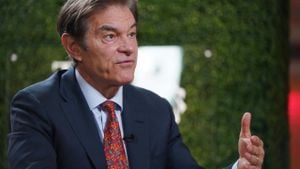TikTok is facing immense scrutiny as it battles the proliferation of misinformation on its platform, especially with the 2024 U.S. presidential election looming on the horizon. Recent actions taken by the company, including banning accounts connected to Russian state media, are part of its broader strategy to maintain the integrity of electoral processes and user safety, highlighting its role in the ever-evolving digital information ecosystem.
On September 24, TikTok announced the removal of multiple accounts linked to Russian media firms, particularly those associated with Rossiya Segodnya and TV-Novosti. These companies have ties to well-known content generators like RT (formerly Russia Today) and Sputnik, which have been accused of disseminative activities aimed at swaying public opinion globally. The video-sharing platform stated these accounts violated its community guidelines by engaging in covert influence operations.
"Content from these accounts was already restricted within the European Union and United Kingdom, and globally their visibility was limited, as the platform strives to curb attempts to manipulate foreign audiences with misleading information about worldwide events," TikTok explained. The immediate result of this purge is aimed not only at eliminating harmful rhetoric but also at reinforcing the company’s commitment to transparency and accountability.
This decision coincided with the implementation of new U.S. sanctions against Russia, which were largely seen as consequences of the Kremlin's involvement in international misinformation efforts. The timing could not be more pertinent, as political moods and social sentiments are shifting dramatically leading up to the next presidential election as misinformation continues to plague social media.
The video-sharing app is also preparing to provide more detailed insights about the removed accounts through its forthcoming September report on covert influence operations. This will follow the company’s earlier August report, which also highlighted the removal of several networks involved in misinformation campaigns. "We are dedicated to ensuring our platform remains safe for our users. We will continue to enforce stringent policies and collaborate with experts to diminish the spread of misinformation," the company assured its users.
Beyond political misinformation, TikTok has recently entered the healthcare space to combat a different type of misinformation. Partnering with the World Health Organization (WHO), TikTok aims to provide reliable health information, targeting misleading medical claims prevalent on social media platforms. The collaboration includes augmenting the availability of scientifically-backed health content through channels like Fides, which consists of health professionals reaching hundreds of millions of followers across various platforms.
Through these initiatives, TikTok is positioning itself to play catch-up with its chief competitors like YouTube, which has also faced pressure to manage misleading content effectively. YouTube has been clamping down on both medical and political misinformation, taking action against channels linked to the same sources as TikTok’s recent purges. The competitive pressures are high, as TikTok looks to improve its public perception and credibility during this sensitive election period—a time when any misstep could have serious ramifications.
At the core of TikTok’s strategy is not only limiting harmful content but also improving overall user experience on its platform. With over 170 million American users, TikTok is making strides to establish itself as not just an entertainment hub but also as a reliable source for factual information, especially as misinformation poses ever-evolving threats to public consensus and safety.
The challenges TikTok faces are not trivial. They encompass not just the technical aspects of content moderation but also the significant socio-political dynamics of today’s online discourse. With elections on the horizon and accusations against certain groups of attempting to manipulate public sentiment, TikTok is under pressure to showcase its commitment to safeguarding the digital space of its users.
So, whether it’s through fortifying user safety practices, collaborating with health authorities, or administratively executing bans on dubious accounts, TikTok is undeniably at the forefront of the battle against misinformation. The stakes are incredibly high, as credibility, user trust, and the very fabric of democratic processes depend on how effectively social media can manage and counteract misleading narratives. This relentless fight reflects the growing concerns over digital platforms’ responsibilities in curbing misinformation—the stakes could not be higher as the world watches these developments closely, particularly through the lens of upcoming elections.
With all these proactive measures, TikTok endeavors not just to navigate but to steer the course toward greater reliability and transparency on its platform. The narrative continues to evolve as both TikTok and its users grapple with the challenges and possibilities within this complex digital frontier.



